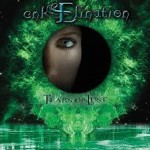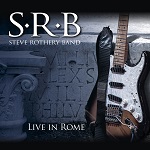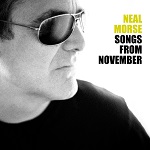
The Resonance Festival held at the very beginning of August was a four-day charity event held in The Bedford in Balham, featuring bands from all aspects of the contemporary progressive rock scene, everything from the traditional and the neo to the avant garde. I couldn’t get to the first two days, the evening only events featuring Mostly Autumn, Also Eden and Lifesigns. But I did attend the all-day events of Saturday and Sunday where the three rooms played host to a wide variety of bands.
The biggest room, the magnificent circular Globe was booked for a comedy night on the Saturday, but it was still available during the afternoon. So that became the acoustic stage for the day. First up was looping guitar maestro Matt Stevens, conjuring tapestries of sound from a battered acoustic guitar and an array of looping pedals. He’s a familiar sight on the prog circuit having opened for just about everyone, but he’s still an entertaining performer no matter how many times you’ve seen him.
After The Far Meadow, whose competent neo-prog was spoiled by terrible sound, it was back to The Globe for a beautiful set from Luna Rossa, the acoustic duo of Anne-Marie Helder and Jon Edwards of Panic Room. They’re not “Panic Room unplugged”, but a completely separate side-project playing their own material rather than Panic Room songs. With Jon on piano and Anne-Marie adding some acoustic guitar and flute, their beautiful set featured songs from the album “Sleeping Pills and Lullabies”, a couple of interestingly-reworked covers, and one new number offering a tantalising glimpse of their second album that they’re currently part-way through recording.
Anna Phoebe and her band were the first all-instrumental act of the weekend. With lead instruments of violin and acoustic guitar for much of the set, they were the missing link between rock and gypsy jazz. Anne Phoebe is a stunning virtuoso musician with a dramatic stage presence to match.
Matt Stevens celebrated his birthday by returning to the stage a second time, this time in electric mode with a full band in the shape of The Fierce and The Dead. They’re not an easy band to describe, but their instrumental sound driven by interlocking guitars with a raw sound comes over as a kind of punk version of King Crimson. It was intense and Earth-shatteringly loud, and the audience staggered out of the room wondering exactly what had hit them.
Saturday ended with the symphonic majesty of The Enid. Much like their performance at HRH Prog back in March, the set mixed older favourites with newer material from “Invictia”, ending with a mesmerising “Dark Hydraulic” and a version of Barclay James Harvest’s “Mockingbird”. There is nobody else remotely like The Enid, and they, perhaps more than any other band embody the spirit of everything progressive rock is about.
So ended the first day, and that was just the highlights; there are also honourable mentions to Unto Us, who bravely playing their set with a laptop replacing their ailing drummer, and the avant-noise of Trojan Horse, a band with feet in enough different camps they do supports for the likes of post-punk veterans The Fall.
Sunday’s bill was a day of clashes between the various stages, made worse by timings going awry which made it easier to wander from stage to stage seeing what sounded interesting rather than planning things too much in advance. Early bands included Rat Face Lewey, a very young power trio, at times verging on punk, at others playing some more melodic guitar lines, and Hekz with their strongly song-focussed prog-metal. Vocals are often the weak link in prog-metal, but Hekz’ Matt Young had quite a remarkable voice.
Maschine were the first band on the main stage, now in its rightful place in The Globe, and started late because of technical problems. Although to some extent they’re a vehicle for Luke Machin’s virtuoso guitar playing, there’s some solid composition behind all the flash. They’re the missing link between prog-metal and jazz-fusion. Quite a bit of their entertaining set was new, as yet unrecorded material alongside highlights from their début “Rubidium”. They’re not quite the same without Georgia, though.
King Bathmat were actually three-quarters of King Bathmat, since they were without their keyboard player and played as a power trio. In such a stripped-down form they sounded like a completely different band than they do on record, but nevertheless did make a strong impression, dominated by John Bassett’s psychedelic lead guitar. Because the two sets clashed I only caught the end of Synaesthesia’s set, but what little I heard it seemed like their set was something special indeed, a remarkable combination of youthful enthusiasm and compositional maturity well beyond their years.
Mr So and So turned out to be one of the unexpected highlights of the weekend, with a really powerful performance. They’re a band representing the song-centric side of things with distinctive use of dual male-female lead vocals. Their set was tight and intense with both guitar crunch and soaring melodies, with Charlotte Evans giving a very strong vocal performance, and some tremendous shredding from Dave Foster.
Former Enid guitarist Frances Lickerish threw a complete curveball and had to be the strangest act of the weekend. He started out playing some solo instrumental pieces on, of all things a lute, before being joined by vocalist Hilary Palmer for some genuine medieval songs. It seemed like folk’s revenge for Prog taking over Cropredy this year, and made Blackmore’s Night look like the Dungeons and Dragons parody it is. He even played a few bars of Smoke on the Water. On a lute.
At this point things started to go really pear-shaped. Swedish proggers Änglagård, making a very rare UK appearance were due on the main stage at 6:30. But despite already being allocated a two-hour setup time, they were nowhere near being ready to go at the scheduled time, and were ultimately well over an hour late, throwing the rest of the timings into disarray. I appreciate that a band relying so much on temperemental vintage gear (including two Mellotrons) might suffer from technical problems. But I was told the exact same thing happened last year at Night of the Prog at Loreley, which makes we wonder if a band like this should really be playing festivals at all.
The delay did give the chance to check out the other two stages, with some in-your-face metal from Jupiter Falls, and an entertaining unplugged set from 70s veterans Gnidrolog. Änglagård finally did hit the stage very, very late with their largely instrumental and very retro classic prog sound. It was a swirling mix of flute, Hammond, Mellotron, Fender Rhodes, saxes and an array of percussion instruments including a massive gong. All very heady stuff, although there was always the nagging doubt at the back of the mind that this was all a Spinal Tap style parody of prog excess.
Headliners Bigelf came on very late, and played a truncated set despite the hastily extended curfew. But it all proved worth the wait, and they blew everyone away, sounding like a cross between The Crazy World of Arthur Brown and early Queen. Few people in the prog world have such a magnetic stage presence as frontman and keyboard player Damon Fox. He completely dominates the stage, playing a Hammond B3 with one hand and a Mellotron with the other while singing lead at the same time. With a setlist drawn heavily from “Cheat the Gallows” and “Into the Maelstrom” they bought the festival to a spectacular if somewhat belated close.
Resonance was an entertaining festival, and the variety of acts covered almost all corners of progressive rock’s increasingly large tent. The only failing was that the whole thing was probably a little over-ambitious with three stages and far too many bands to be able to see everyone. One thing that amused me was the way the bar kept running out of real ale; did nobody tell them what prog fans drink?
 Unlike many other genres of music, progressive metal is a global phenomenon. Its reach now extends well beyond the traditional strongholds in north America and northern Europe. Dubai-based Empty Yard Experiment are the sort of band that exemplify this, a multinational band with members from Serbia, Iran and India.
Unlike many other genres of music, progressive metal is a global phenomenon. Its reach now extends well beyond the traditional strongholds in north America and northern Europe. Dubai-based Empty Yard Experiment are the sort of band that exemplify this, a multinational band with members from Serbia, Iran and India. When Empires Fall is the latest addition to the incestuous York-based progressive rock scene. It’s the new project from former Stolen Earth and Breathing Space bassist Paul Teasdale. A sample track, “Call To The Night Watch” with vocalist Aleksandra Koziol appeared something like a year ago, but since then we’ve had a long wait for the album.
When Empires Fall is the latest addition to the incestuous York-based progressive rock scene. It’s the new project from former Stolen Earth and Breathing Space bassist Paul Teasdale. A sample track, “Call To The Night Watch” with vocalist Aleksandra Koziol appeared something like a year ago, but since then we’ve had a long wait for the album.

 Just when it seemed that Valkyrie-fronted metal has reached saturation point, along comes Anglo-Finnish outfit enkElination to suggest that there’s life in the genre yet.
Just when it seemed that Valkyrie-fronted metal has reached saturation point, along comes Anglo-Finnish outfit enkElination to suggest that there’s life in the genre yet. Opeth’s eleventh studio album, “Pale Communion” has been one of the most anticipated releases of the year. Their last album, 2011′s “Heritage” ended up strongly dividing opinion. For every fan who applauded their exploration of new sonic territories there seemed to be another who bemoaned their move away from the metal roots.
Opeth’s eleventh studio album, “Pale Communion” has been one of the most anticipated releases of the year. Their last album, 2011′s “Heritage” ended up strongly dividing opinion. For every fan who applauded their exploration of new sonic territories there seemed to be another who bemoaned their move away from the metal roots.

 Steve Rothery’s distinctive guitar work has always been Marillion’s secret weapon right from the very early days of the band. With a less-is-more approach that doesn’t believe in wasting notes and an evocative tone it’s his playing that’s been the cornerstone of their sound for more than thirty years.
Steve Rothery’s distinctive guitar work has always been Marillion’s secret weapon right from the very early days of the band. With a less-is-more approach that doesn’t believe in wasting notes and an evocative tone it’s his playing that’s been the cornerstone of their sound for more than thirty years. Just about every software testing professional with an online presence is concerned about ISO 29119′s likely impact on the profession. The consensus is that forcing a highly bureaucratic one-size-fits-all cookie-cutter approach to testing across the whole software industry is unlikely to result in higher quality software, but will almost certainly stifle innovation and inhibit exploration of new creative approaches.
Just about every software testing professional with an online presence is concerned about ISO 29119′s likely impact on the profession. The consensus is that forcing a highly bureaucratic one-size-fits-all cookie-cutter approach to testing across the whole software industry is unlikely to result in higher quality software, but will almost certainly stifle innovation and inhibit exploration of new creative approaches. Since leaving Spock’s Beard to “pursue a more spiritual path”, Neal Morse has released a string of albums combining over-the-top progressive rock with Evangelical Christian lyrics so heavy-handed than even many Christians find them hard to stomach.
Since leaving Spock’s Beard to “pursue a more spiritual path”, Neal Morse has released a string of albums combining over-the-top progressive rock with Evangelical Christian lyrics so heavy-handed than even many Christians find them hard to stomach.